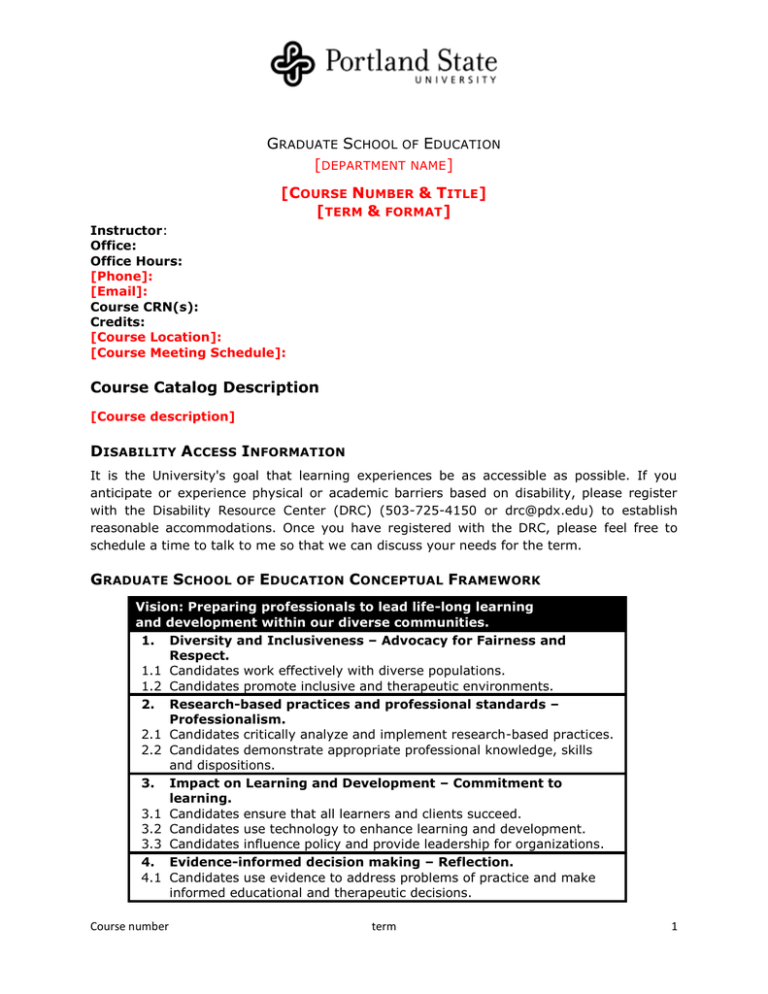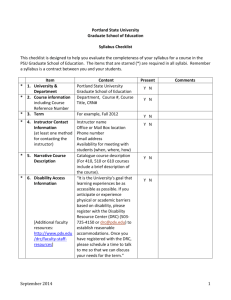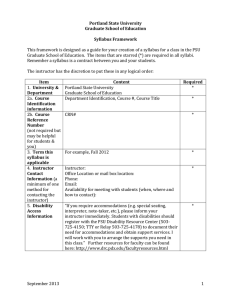G S E
advertisement

GRADUATE SCHOOL OF EDUCATION [DEPARTMENT NAME ] [COURSE NUMBER & TITLE ] [TERM & FORMAT ] Instructor: Office: Office Hours: [Phone]: [Email]: Course CRN(s): Credits: [Course Location]: [Course Meeting Schedule]: Course Catalog Description [Course description] DISABILITY A CCESS INFORMATION It is the University's goal that learning experiences be as accessible as possible. If you anticipate or experience physical or academic barriers based on disability, please register with the Disability Resource Center (DRC) (503-725-4150 or drc@pdx.edu) to establish reasonable accommodations. Once you have registered with the DRC, please feel free to schedule a time to talk to me so that we can discuss your needs for the term. GRADUATE SCHOOL OF EDUCATION CONCEPTUAL FRAMEWORK Vision: Preparing professionals to lead life-long learning and development within our diverse communities. 1. Diversity and Inclusiveness – Advocacy for Fairness and Respect. 1.1 Candidates work effectively with diverse populations. 1.2 Candidates promote inclusive and therapeutic environments. 2. Research-based practices and professional standards – Professionalism. 2.1 Candidates critically analyze and implement research-based practices. 2.2 Candidates demonstrate appropriate professional knowledge, skills and dispositions. 3. Impact on Learning and Development – Commitment to learning. 3.1 Candidates ensure that all learners and clients succeed. 3.2 Candidates use technology to enhance learning and development. 3.3 Candidates influence policy and provide leadership for organizations. 4. Evidence-informed decision making – Reflection. 4.1 Candidates use evidence to address problems of practice and make informed educational and therapeutic decisions. Course number term 1 CONTENT AREAS (REQUIRED PROGRAM OUTCOMES (AS FOR COUN ED DEPARTMENT ) NEEDED BY PROGRAM ) [At the minimum you need either Program outcomes OR Professional Standards.] PROFESSIONAL STANDARDS (AS NEEDED BY PROGRAM ) [It is helpful to number standards so that you can use numbers in the subsequent table.] COURSE LEARNING OUTCOMES, STANDARDS, LABELED DIFFERENTLY DEPENDING ON ASSESSMENTS [MAY BE PROGRAM — E.G., OBJECTIVES , SKILLS, AND KNOWLEDGE ] Course Outcome GSE Conceptual Framework Professional Standard or Program Outcomes Assessment [i.e., 2.1] Course number term 2 METHODS OF [REQUIRED INSTRUCTION OVERVIEW FOR COUN ED DEPARTMENT ] REQUIRED TEXTS [USE APA FORMAT TO LIST TEXTS & READINGS ] COURSE SCHEDULE Wk Date Topics Readings and Assignments Due 1 2 3 4 5 6 7 8 Course number term 3 Wk Date Topics Readings and Assignments Due 9 10 11 Course evaluation [especially important to include as an activity for online courses] ASSIGNMENTS [Full description of assignments] [If the class is a 4xx/5xx class you will need to provide differentiated assignments for undergraduates and graduate students; see sample syllabus] GRADING [Assessment criteria is strongly recommended (rubrics)] COURSE AND UNIVERSITY POLICIES Late Assignments Attendance and Tardiness Classroom Demeanor and Courtesy [highly recommended] Course number No explicit GSE policy. You may include guidelines that are comfortable for you. However an explicitly stated policy is fair to students and helps to avoid future problems. No explicit GSE policy. You may include guidelines that are comfortable for you. An explicitly stated policy helps to avoid future problems. Many students are working professionals and there is often a balance between their work demands and the rigor we expect from our coursework. No explicit GSE policy. Consider including a statement about classroom demeanor and courtesy, such as: “Because students may not share the same opinions on different topics on this class, it is important that we remember to respect the opinions and ideas of others. We expect all students to show respect and courtesy for all members of this class at all times.” You may also want to make reference to the PSU’s Student Conduct Code or the GSE’s Behavior and Performance Guidelines : http://www.pdx.edu/sites/www.pdx.edu.education/files/gse_handboo k_student_conduct.pdf term 4 Incompletes [highly recommended, see sample text] Academic Integrity [highly recommended] A student may be assigned an Incomplete (I) grade by an instructor when all of the following four criteria apply: 1. Quality of work in the course up to that point is C level or above. 2. Essential work remains to be done. “Essential” means that a grade for the course could not be assigned without dropping one or more grade points below the level achievable upon completion of the work. 3. Reasons for assigning an Incomplete must be acceptable to the instructor. The student does not have the right to demand an Incomplete. The circumstances must be unforeseen or be beyond the control of the student. An instructor is entitled to insist on appropriate medical or other documentation. In no case is an "Incomplete" grade given to enable a student to do additional work in order to raise a deficient grade. 4. A written agreement, signed by both the student and the instructor, should include a statement of the remaining work to be done to remove the Incomplete grade, and the date, not to exceed one year from the end of the term of enrollment for the course, by which work must be completed in order to earn credit toward the degree. The instructor may specify the highest grade which may be awarded upon completion; the grade awarded should not exceed the level of achievement attained during the regular course period. See http://pdx.smartcatalogiq.com/en/20142015/Bulletin/Graduate-Studies/Enrollment/Incompletes The following constitutes conduct as proscribed by Portland State University for which a student or student organization or group is subject to disciplinary action: (1) Obstruction or disruption of teaching, research, administration, disciplinary procedures or other University activities, including the University's public service functions or other authorized activities on University-owned or -controlled property, or any other location where teaching, research, administration, disciplinary procedures or other University activities take place. (2) All forms of academic dishonesty, cheating, and fraud, including but not limited to: (a) plagiarism, (b) the buying and selling of course assignments and research papers, (c) performing academic assignments (including tests and examinations) for other persons, (d) unauthorized disclosure and receipt of academic information and (e) falsification of research data. PSU Student Conduct Code # 577-031-0136 Returning student work [highly recommended] Course number Due to FERPA guidelines, student work must be directly returned to each student (either face to face or via electronic or “snail” mail). If students want a hard copy of their work returned, they should provide a stamped, self-addressed envelope large enough to hold the assignments to be returned. term 5 Student Health Insurance [highly recommended] PSU provides students taking 5 or more inload, non self-support credits per term (1 credit for international students) with the mandatory PSU/Aetna Student Health Insurance Plan. See http://www.pdx.edu/shac/insuranceplan for more information. Students may waive the insurance but must provide proof of enrollment in a comparable insurance policy offered through another company. Students only need to waive out once per academic year. All eligible students will be charged for insurance unless they waive out by the waiver application deadline, the second Sunday of each term. See http://www.pdx.edu/shac/insurancewaiver for specific information and directions about waiving the health insurance, and a link to the online waiver application. Contact insurancehelp@pdx.edu for more information. Safe Campus Module LGBTQ Resolution Statement [Recommended by ___ Dept.] Counselor Ed Policy Statement [Required by Coun Dept] Portland State University desires to create a safe campus for our students. As part of that mission, PSU requires all students to take the learning module entitled Creating a Safe Campus: Preventing Gender Discrimination, Sexual Harassment, Sexual Misconduct and Sexual Assault. See http://www.pdx.edu/sexual-assault/safecampus-module. If you or someone you know has been harassed or assaulted, you can find the appropriate resources on PSU’s Enrollment Management & Student Affairs: Sexual Prevention & Response website at http://www.pdx.edu/sexual-assault As part of its commitment to social justice and human dignity, the Curriculum and Instruction Department demonstrates LGBTQ advocacy through inclusive policies and practices that are both intentionally proactive and strategically responsive. Department Policy Statement: The counseling profession requires a high level of personal integrity, self-awareness, and personal maturity. Demonstrating professionalism in classroom behavior, as well as being present and engaged in classroom activities, is expected at all times as a graduate student in Counselor Education. Students are expected to attend all class meetings; however, one absence is not considered excessive. Students whose beliefs, religious practices, or lifestyles may conflict with class attendance from time to time should discuss such issues with the course instructor at the beginning of the term. If possible, arrangements should be made to make up missed attendance-related assignments and experiences. It is up to the student and instructor to negotiate a satisfactory solution with respect to absences. Students and faculty are expected to maintain an atmosphere in which controversial issues, germane to the subject matter, can be examined and discussed. In exercising this freedom of expression, faculty and students are expected to exercise appropriate restraint and show respect for the opinion of others. Course number term 6 The Counselor Education program seeks to balance providing care and support, high expectations, and opportunities for participation in meaningful activities. All students are expected to participate in constructing a respectful learning environment in the classroom. Arrive to class on time, stay for the entire class, come back from breaks on time, turn off cell phones, etc. Be mindful of what might detract from the learning experience of students and faculty alike (e.g., talking to fellow students during lecture). All students in the program must demonstrate behavior that is consistent with the Ethical Standards put forth by the American Counseling Association: http://www.counseling.org/ Failure to do so can result in termination from the program. Course number term 7



